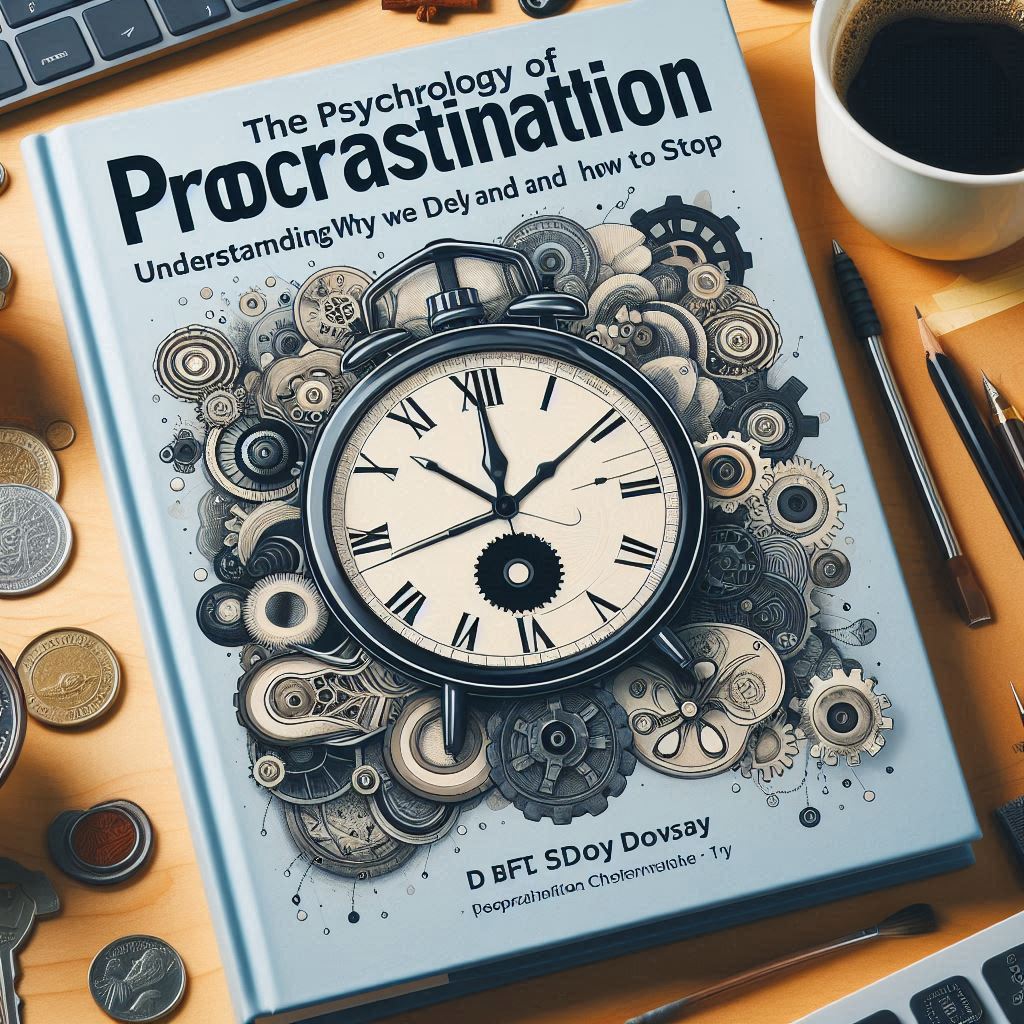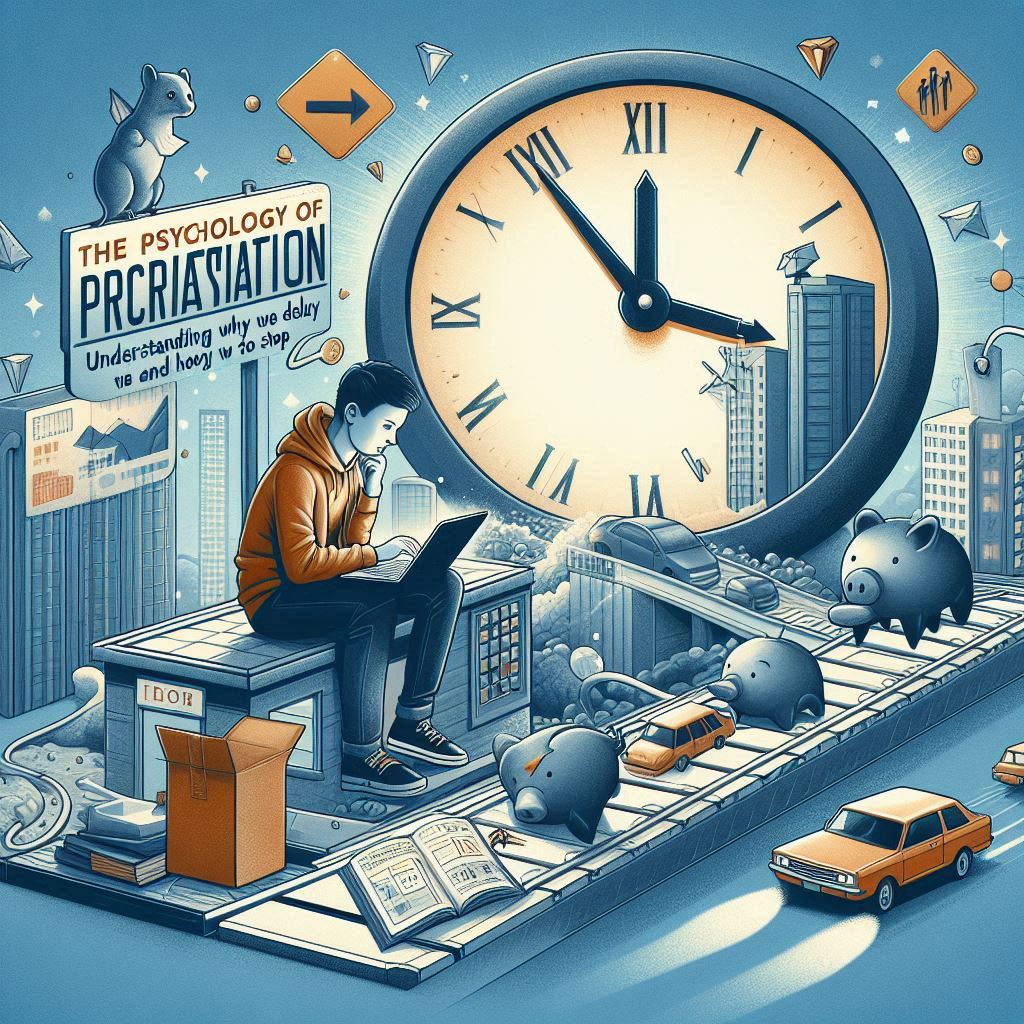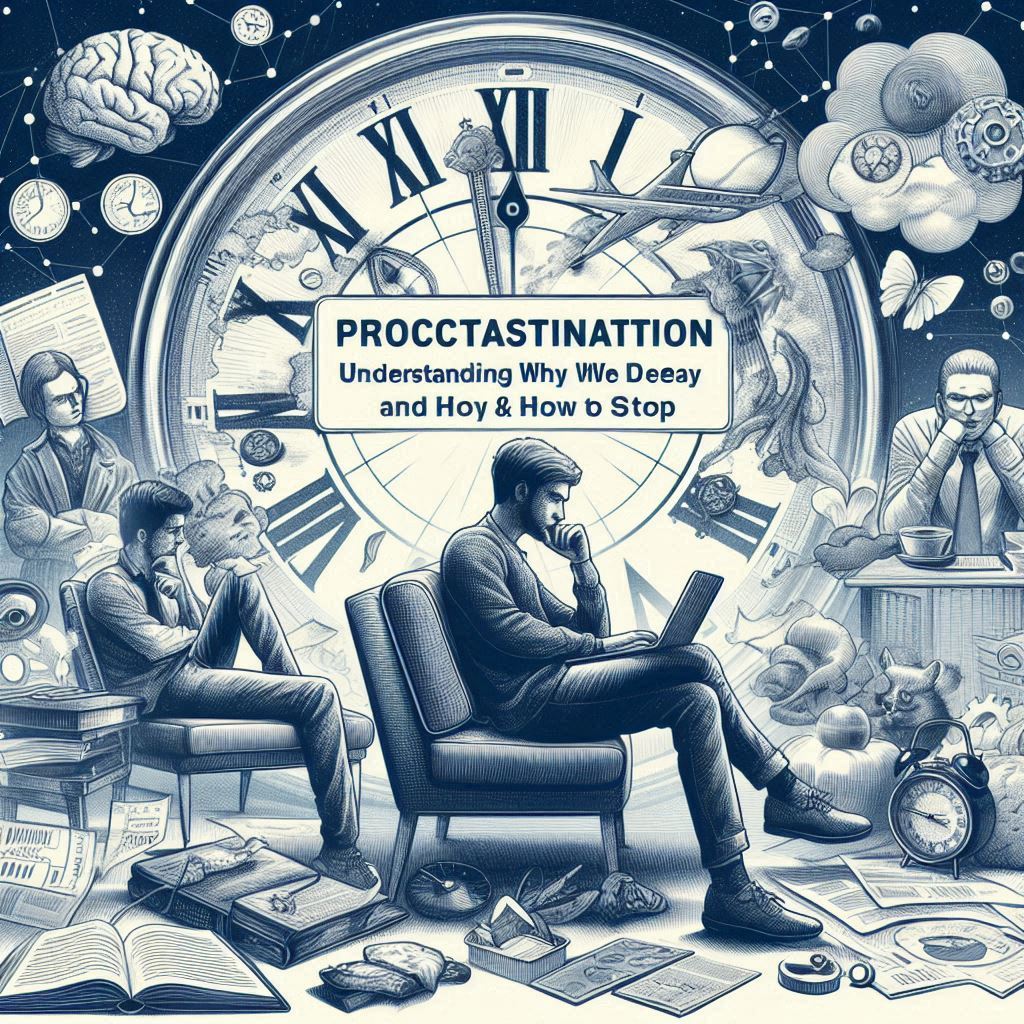Procrastination is something that almost everyone experiences at some point. Whether it’s putting off a school project, delaying chores, or avoiding important work tasks, the habit of procrastination can sneak into our lives and disrupt productivity. The irony is, most people know they’re procrastinating when they do it, yet they still struggle to stop. But what drives this behavior? Is procrastination just about being lazy or is there something deeper going on?
This article will explore the psychology behind procrastination, why it happens, and most importantly, how we can overcome it.
What Is Procrastination?
Procrastination is the act of delaying or postponing tasks that should be done now. Even when people recognize that completing a task would be beneficial, they might still avoid it. Instead of focusing on the task at hand, procrastinators often engage in more pleasant or easier activities like browsing the internet, watching TV, or scrolling through social media.
The reasons for procrastination can vary, but the results are often the same—added stress, missed deadlines, and a feeling of failure. But procrastination is not always about poor time management; it often has deeper roots in psychology.
Why Do We Procrastinate?
The question of why we procrastinate has puzzled psychologists for years. It turns out, procrastination is not just a bad habit, it is tied to our emotions, self-control, and even our brains. Here are some of the primary psychological reasons why people procrastinate:
1. Fear of Failure
One of the most common reasons people procrastinate is the fear of failure. If you’re worried that you won’t be able to complete a task to a certain standard, you may delay starting it to avoid confronting that fear. For example, a student who fears they won’t write a perfect essay may avoid starting altogether. The act of procrastinating then serves as a protective mechanism; if you never try, you never fail.
2. Perfectionism
Procrastination and perfectionism often go hand-in-hand. Perfectionists set extremely high standards for themselves, and the fear of not meeting these standards can lead to procrastination. Instead of doing something imperfectly, perfectionists often put it off until the pressure builds, leading to rushed and often incomplete work.
3. Instant Gratification
Our brains are wired for instant gratification. When we face a challenging task, the brain tends to focus on the short-term discomfort or difficulty of the task rather than the long-term reward of finishing it. This is why so many people procrastinate by watching TV or playing games—they provide immediate pleasure. In contrast, tasks like writing a report or cleaning the house offer delayed rewards, so they are harder to start.
4. Lack of Motivation
If you don’t feel motivated or see the value in completing a task, it’s easy to push it aside. This is common in tasks that don’t seem enjoyable or have immediate rewards, such as studying for an exam or working on a project that doesn’t interest you.
5. Overwhelm
Sometimes tasks feel so big or complicated that you don’t even know where to begin. The feeling of being overwhelmed can make it easier to delay starting rather than tackling the task head-on. This is particularly true for projects that seem too difficult or time-consuming.
6. Low Self-Confidence
People who struggle with low self-confidence often procrastinate because they doubt their ability to complete the task. If you don’t believe in your own competence, it’s tempting to avoid the task altogether rather than risk failure or embarrassment.
7. Decision Paralysis
Having too many choices or decisions to make can lead to what psychologists call decision paralysis. If you’re not sure which direction to take or how to approach a task, you may end up procrastinating because it feels safer to do nothing than to make the wrong choice.

The Negative Impact of Procrastination
While procrastination might offer temporary relief, the long-term consequences can be damaging. Here are some ways procrastination negatively affects people:
1. Increased Stress
One of the most immediate effects of procrastination is stress. When you put off tasks, they pile up, and the pressure to complete them increases. This stress can lead to feelings of anxiety, overwhelm, and even burnout.
2. Reduced Productivity
Procrastination directly affects your ability to get things done. By delaying tasks, you reduce your productivity, often leading to rushed work or missed deadlines. This can harm your reputation at work or school, and lead to poor results.
3. Poorer Health
Procrastination doesn’t just affect your work, it can also harm your health. People who procrastinate often neglect self-care tasks like exercising, eating healthy, or visiting the doctor. Over time, this can lead to physical and mental health problems.
4. Damaged Relationships
Procrastination can also negatively affect personal relationships. For instance, if you consistently avoid important tasks at home, your partner or family members may become frustrated with you, leading to tension and conflict.
Understanding the Procrastination Cycle
Procrastination often follows a predictable cycle:
- You decide to delay a task because it seems too difficult, stressful, or unpleasant.
- You engage in a distraction (like watching TV or browsing social media) to avoid the discomfort of the task.
- You feel relief because you’re avoiding the task, but deep down, you know it’s still waiting for you.
- You start to feel anxious and guilty as the deadline approaches, but you continue to avoid the task.
- You rush to complete the task at the last minute, often leading to lower-quality work and high levels of stress.
- You feel regret about procrastinating, and vow to change your behavior next time—but the cycle often repeats.
Breaking this cycle requires self-awareness and deliberate effort. Below, we’ll explore several strategies for overcoming procrastination and boosting productivity.

How to Stop Procrastinating: 7 Practical Methods
The good news is, procrastination is not an irreversible habit. There are proven strategies that can help you break free from procrastination and become more productive. Here are seven practical methods:
1. Break Tasks into Smaller Steps
When a task feels overwhelming, breaking it down into smaller, manageable steps can make it feel less daunting. Instead of focusing on the entire project, start with one small step. For example, if you’re writing a report, begin by outlining the main points. Once you complete one small task, you’ll gain momentum to keep going.
2. Set Clear Deadlines
Setting specific deadlines for yourself can help you stay on track. Instead of saying “I’ll do this later,” give yourself a clear time frame. Even if the task doesn’t have an official deadline, setting one for yourself can create a sense of urgency. Make sure the deadline is realistic but firm.
3. Use a Timer (The Pomodoro Technique)
The Pomodoro Technique is a time management method that involves working for 25 minutes and then taking a 5-minute break. After four “Pomodoros” (work sessions), you take a longer break. This method helps break tasks into focused intervals, reducing the urge to procrastinate. Knowing you only have to work for 25 minutes makes the task seem less overwhelming.
4. Eliminate Distractions
Distractions are one of the biggest barriers to overcoming procrastination. If you find yourself constantly distracted by your phone, TV, or social media, try removing those distractions while you work. Turn off notifications, block distracting websites, or work in a quiet space. By eliminating these distractions, you can stay focused on the task at hand.
5. Reward Yourself
Our brains are wired to seek rewards, and you can use this to your advantage. After completing a task or making progress, reward yourself with something you enjoy, like a snack, a short break, or a favorite activity. The promise of a reward can motivate you to get started, and the positive reinforcement will help reinforce the habit of productivity.
6. Practice Self-Compassion
One of the reasons people procrastinate is because they’re overly critical of themselves. If you’re constantly beating yourself up for not being perfect, it can make starting tasks even harder. Practice self-compassion by acknowledging that everyone struggles with procrastination sometimes. Instead of focusing on your past failures, focus on what you can do differently moving forward.
7. Focus on the Long-Term Benefits
When you’re stuck in a procrastination cycle, it’s easy to focus on the short-term discomfort of a task rather than the long-term rewards. Take a moment to think about how completing the task will benefit you in the future. Will it help you achieve a personal goal? Improve your career? Reduce your stress? Keeping these benefits in mind can help you push through the initial resistance.

Procrastination is a complex behavior, driven by psychological factors like fear, perfectionism, and a desire for instant gratification. But while procrastination may offer temporary relief, it often leads to long-term stress, reduced productivity, and missed opportunities.
The good news is, procrastination is a habit that can be broken. By understanding the psychological reasons behind it, and applying practical strategies like breaking tasks into smaller steps, setting clear deadlines, and practicing self-compassion, you can regain control of your time and start living a more productive and fulfilling life.
Overcoming procrastination won’t happen overnight, but with persistence and patience, you can change your habits and build a healthier relationship with time.

I wanted to put you the little remark to finally thank you so much once again for your personal lovely concepts you have contributed at this time. This is quite tremendously generous of you in giving openly precisely what a number of us would have advertised as an electronic book to earn some bucks on their own, precisely seeing that you could have done it in case you wanted. These pointers also acted as the fantastic way to be certain that other people online have the identical dreams similar to my own to figure out more and more in terms of this problem. I’m sure there are thousands of more pleasurable opportunities up front for those who looked over your blog post.
Hello. fantastic job. I did not imagine this. This is a great story. Thanks!